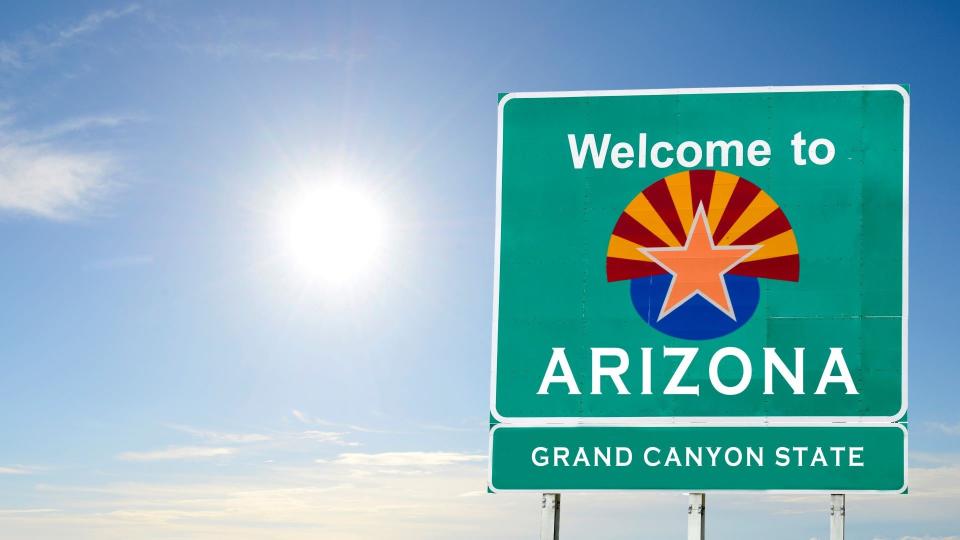4 Reasons $1 Million Will Only Last You 15 Years in Retirement in Arizona

According to our research, $1 million will only last you about 15 years in retirement in Arizona. In fact, a $1 million nest egg will last you 15 years, 8 months, and 20 days in the Grand Canyon State. The same amount of money may stretch nearly two decades in many other states. Contributing to this shortened amount of time includes high costs of housing and higher than average transportation and utilities expenses.
Find Out: Can You Realistically Follow Dave Ramsey’s 8% Retirement Rule?
For You: 7 Common Debt Scenarios That Could Impact Your Retirement — and How To Handle Them
We asked Dennis Shirshikov, head of growth at Gosummer.com and a finance professor at The City University of New York, to provide some insight on why retiring in Arizona with $1 million will only last 15 years. He explained, “While Arizona is often touted for its relatively low cost of living compared to coastal states, retirees face a range of expenses that can quickly deplete their savings.”
Here are four reasons the finance expert says $1 million will only last you 15 years in retirement in Arizona.
Wealthy people know the best money secrets. Learn how to copy them.
Healthcare Costs
“One significant factor is healthcare costs. Although Arizona has a reputation for affordable living, healthcare expenses for retirees can be quite substantial,” said Shirshikov. “Arizona’s large retiree population means that demand for healthcare services is high, which can drive up costs. Additionally, while Medicare covers some expenses, many retirees face out-of-pocket costs for medications, treatments, and long-term care that aren’t fully covered.”
Annual healthcare costs in the southwestern state are $7,178 on average. This amount is only slightly under the 2024 first-quarter cost of living for healthcare average in the United States. It can be challenging to reduce healthcare costs, but retirees should look into Medicare and other less expensive options to see if they qualify.
Read Next: 10 Things Boomers Should Always Buy in Retirement
Housing Costs
“Housing costs, while generally lower than in states like California or New York, have been rising steadily in Arizona,” noted the finance professor. “The influx of people moving to Arizona for its warm climate has driven up property prices and rental rates, especially in popular retirement areas like Scottsdale and Tucson. Even those who own their homes outright may face increasing property taxes and maintenance costs.”
The average annual housing cost in the state is $15,059. Housing costs in Arizona are approximately 28% higher than the national average. Housing costs maybe $5,000 less in other states, which may be preferential for retirees on a fixed income. If you are looking for ways to reduce your housing costs, you can consider downsizing or moving to an area within the state that may be less expensive.
Inflation
“Inflation is another critical factor,” said Shirshikov. “Over the span of 15 years, the purchasing power of money can significantly decline. This means that the same basket of goods and services will cost more in the future than it does today. Retirees on a fixed income need to account for an average inflation rate of about 2-3% annually. This may seem minor, but compounded over 15 years, it can erode a substantial portion of a $1 million nest egg.”
Inflation, which is measured by the Consumer Price Index, soared to near-record levels in 2022. If inflation rises, retirees are often hit hardest since their income is rarely adjusted to account for the increase in costs. While inflation has cooled over the last few years, it can still affect retirees significantly.
Lifestyle Expectations
“Lifestyle expectations also play a role,” added Shirshikov. “Many retirees move to Arizona for the lifestyle, including access to golf courses, dining, and entertainment, which can add up. A couple aiming to maintain a higher quality of life, with frequent travel and leisure activities, might find their expenses outpacing their initial budget.”
He concluded, “In comparison to other states, Arizona’s affordability is nuanced. While it may be cheaper than many coastal states, it is more expensive than many parts of the Midwest and South, where housing and healthcare costs can be lower. Therefore, careful planning and realistic budgeting are essential for ensuring that a $1 million retirement fund lasts longer than 15 years in Arizona.”
Methodology: In order to find how long $1,000,000 will last across the country, GOBankingRates first found (1) the national average annual expenditures for people 65 and older, sourced from the Bureau of Labor Statistics’ 2022 Consumer Expenditure Survey data. Then, GOBankingRates created (2) state-level annual expenditure estimates by multiplying the national figure by each state’s overall cost of living index score for the 3Q 2023 from the Missouri Economic Research and Information Center. Finally, GOBankingRates found (3) how many years $1,000,000 will last in each state by dividing $1,000,000 by each state’s average annual expenditures estimate. All 50 states and the District of Columbia were then ranked with No. 1 being the state where $1,000,000 will last the longest and No. 51 being the state where it will run out most quickly. GOBankingRates provided supplemental information on the average annual cost of groceries, housing, utilities, transportation, and healthcare for people 65 and older in each state by again using MERIC’s cost of living indices for each category to factor out national estimates from the CES. All data was collected on and up to date as of April 23, 2024.
More From GOBankingRates
In Less Than a Decade, You Won't Be Able To Afford Homes in These 20 Arizona ZIP Codes
These 10 Used Cars Will Last Longer Than an Average New Vehicle
Trying to Build Your Savings? Make Sure Your Account Does These 6 Things
This article originally appeared on GOBankingRates.com: 4 Reasons $1 Million Will Only Last You 15 Years in Retirement in Arizona

 Yahoo Finance
Yahoo Finance 